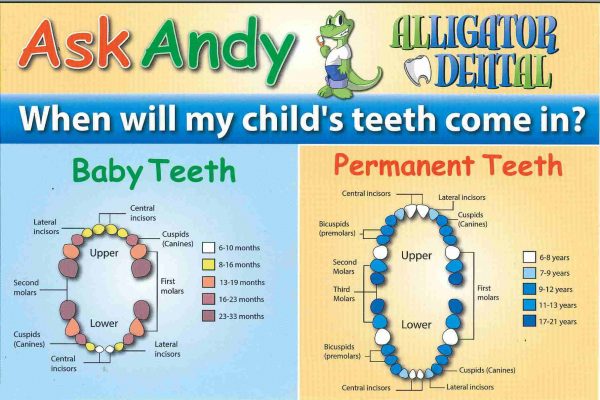Infant/Toddler
First Dental Visit
At Alligator Dental, we understand the unique dental needs of infants and toddlers, and our specialized infant and toddler dentistry services in Cibolo, Gonzales, San Marcos, and Seguin, TX, are designed to ensure your little one’s oral health from the very beginning. Our team of experienced pediatric dentists and friendly staff are dedicated to creating a welcoming and comfortable environment for parents and children during their dental visits.

Infant and toddler dentistry is essential for establishing a strong foundation for your child’s oral health. We recommend scheduling your child’s first dental visit around their first birthday or within six months of their first tooth eruption. During these early visits, our caring dentists will gently examine your child’s mouth to monitor dental development, look for any signs of dental issues, and provide guidance on proper oral care for infants and toddlers. We understand that these initial visits set the stage for a positive dental experience, and our team strives to create a nurturing atmosphere to help your child feel at ease and comfortable during their appointments.
Come experience the difference in infant and toddler dentistry in Cibolo, Gonzales, San Marcos, and Seguin, TX. Schedule a consultation with Dr. Alfred Burns, Dr. Anas Hakimeh, and Dr. Dorothy Causey.
How to Care for Your Infant’s Teeth
Caring for your infant’s teeth and oral health is essential for their overall well-being and sets the foundation for a lifetime of good oral hygiene habits. While infants may not yet have a full set of teeth, it’s crucial to establish a routine to keep their mouths clean and healthy. Here are a few key tips to help you care for your infant’s teeth:
- Start early: Before their first tooth emerges, gently wipe your baby’s gums with a clean, damp cloth or a soft infant toothbrush. This cloth helps remove bacteria and get them accustomed to oral care.
- Introduce brushing: Once your baby’s first tooth appears, usually around six months, use a small, soft-bristled toothbrush designed for infants. Use a smear of fluoride toothpaste (no larger than a grain of rice) and gently brush their teeth twice daily.
- Avoid bedtime bottles: Never put your baby to bed with a bottle filled with anything other than water. Milk or juice can pool around the teeth, leading to tooth decay, a condition known as baby bottle tooth decay.
- Promote healthy eating habits: Encourage a balanced diet with minimal sugary snacks and drinks. Excessive sugar consumption can contribute to tooth decay. Opt for nutritious foods like fruits, vegetables, and dairy products that support oral health.
How to Care for Your Toddlers Teeth
Toddlers are typically more active and independent, so it’s important to establish good oral hygiene habits and make it an enjoyable experience. Here are some key tips to help you care for your toddler’s teeth:
- Encourage regular brushing: Make brushing fun and interactive for your toddler. Use a small, soft-bristled toothbrush and a pea-sized amount of fluoride toothpaste. Please encourage them to brush their teeth at least twice daily, emphasizing the importance of brushing all sides of their teeth and tongue.
- Supervise brushing: While toddlers may want to assert their independence, it’s essential to supervise their brushing until they develop the dexterity to do it effectively. Guide them on proper brushing techniques and ensure they brush for about two minutes each time.
- Promote healthy eating habits: Offer a balanced diet that includes a variety of fruits, vegetables, whole grains, and lean proteins. Limit sugary snacks, juices, and beverages, as excessive sugar consumption can contribute to tooth decay. Encourage drinking water between meals to help rinse away food particles.
- Practice good bottle and sippy cup habits: Avoid allowing your toddler to walk around with a bottle or sippy cup filled with sugary liquids, such as juice or soda. Encourage them to finish their drinks during meals and brush their teeth afterward. Prolonged exposure to sugary liquids can increase the risk of tooth decay.
Our Infant and Toddler Services
At Alligator Dental, we understand that convenience is critical for busy parents. That’s why we have multiple locations across Cibolo, Gonzales, San Marcos, and Seguin, TX. No matter where you reside, we are never too far away! Some of our amazing infant and toddler services include:
Happy Teeth Exams: Our dentists will perform thorough examinations to ensure that your child’s teeth are developing correctly and address any concerns you may have. We’ll keep you well informed about your child’s dental health.
Fights Cavities: From dental cleanings and fluoride treatments to dental sealants, we’ll keep your child’s teeth strong and shielded from dental villains.
Growing Smiles: As your child’s teeth grow, we’ll be there every step of the way. Our dentists will guide oral hygiene practices, teething, and proper nutrition to promote healthy dental habits that will last a lifetime.
Parent Partnerships: We value our partnership with parents, as they play a crucial role in maintaining their child’s oral health. Our team will provide essential tips and advice on dental care at home, ensuring your child’s smile continues to shine between visits.
Infant and Toddler Dentists in Cibolo, Gonzales, San Marcos, and Seguin, TX
At Alligator Dental, we are committed to promoting oral health and preventing dental problems in young children. Our infant and toddler dentistry services include preventive care, early cavity detection, nutritional guidance, and education on proper oral hygiene techniques for parents and caregivers. We believe in partnering with parents to ensure their little ones receive the best dental care possible, leading them to a lifetime of healthy smiles. So why wait? Please schedule an appointment with one of our incredible pediatric dentists at Alligator Dental today.
Please note: Alligator Dental provides dental services for infants and toddlers, but we also cater to older children and teenagers.
Brushing 2x’s a day keeps the cavity bugs away!
All children need to brush their teeth at least two times a day: in the morning after breakfast & at night before bedtime. By disturbing and removing the plaque formation twice a day. parents can minimize or eliminate their child’s potential for tooth decay.
For younger children: A parent should brush the teeth using a pea-sized amount of toothpaste. A5 the child gets older and you see they have the dexterity and patience to property take care of their teeth, you may give over the
task to them. But do periodically monitor their care.
Best Materials & Methods:
• Toothpaste should be approved by the American Dental Association.
• Toothbrushes should be the proper size. small ls better than bigger. Always use a soft nylon brush.
• Brush teeth in a circular manner. This will prevent toothbrush abrasion, excessive wear of the enamel at the gum line.
• A toothbrush should be replaced when it is worn with the bristles splayed, or after more serious colds, infection, Strep throat etc.
Floss only the teeth you want to keep!
Flossing helps remove plaque buildup between teeth where the toothbrush bristles cannot reach. Use a gentle up and down motion to get between each tooth.
Remember the old saying: Only floss the teeth you want to keep.
Keep your enamel strong and bright!
What is fluoride?
The fluoride ion comes from the element fluorine. Fluoride, either applied topically to erupted teeth, or ingested orally (called systemic fluoride) during tooth development helps to prevent tooth decay, strengthen tooth enamel, and reduce the harmful effects of plaque. Fluoride also makes the entire tooth structure more resistant to decay and promotes remineralization, which aids in repairing early decay before the damage is even visible.
Where is fluoride found?
Topical Fluoride is found in products containing strong concentrations of fluoride (i.e .. toothpastes, mouth rinses), fluoridated varnishes and/or gels either topically applied by a dentist or other oral health professional, or prescribed as an at-home regimen (particularly for persons with a high risk of dental caries).
Systemic Fluoride can be ingested through public and private water supplies. soft drinks, teas. as dietary supplements. some bottled water supplies. once ingested, systemic fluoride is absorbed via the gastrointestinal tract and distributed and deposited throughout the body via the blood supply
What health risks are associated with fluoride uses?
In general, fluoride consumption is safe. Health risks associated with Fluoridation usually are limited to misuse and over concentration. To avoid misuse and over concentration: Avoid drinking overly fluoridated water – results of this may cause teeth to become discolored, and may cause the enamel of the teeth to look spotted, pitted, or stained (a condition known as dental fluorosis). Avoid swallowing toothpaste and other dental hygiene products.
Call the local water department and/or the health department to evaluate the fluoride level in your local drinking reservoir. Children are especially vulnerable to dental fluorosis as their developing teeth are more sensitive to higher fluoride levels. Consult a pediatric dentist or other oral health care professional if you notice changes in the condition of your child’s teeth.
Sealants are the best anti-cavity invention!
Sealants protect the occlusal surfaces, inhibiting bacterial growth and providing a smooth surface that increases the probability that the surface will stay clean. The ultimate goal of sealants is penetrating into the pit and fissures of the tooth and sealing them from bacteria.
Sealants don’t take long to complete and can be added to your child’s regular checkup. Ask your doctor if sealants are right for your child!
Indications for Use
Patients with the following circumstances should be evaluated as candidates for sealant placement:
- Children and teenagers when they are in their cavity prone years – as a preventative measure
- Xerostomia (decreased salivation)
- Undergoing orthodontic treatment
- Evidence of incipient caries – white spots that indicate the beginning of a cavity
- Prone to cavities
- Primary molars also can benefit from the placement of sealants.
The American Dental Association and Alligator Dental recommend scheduling a regular dental check up every 6 months.
Prevention is the best philosophy. Regular dental checkups help facilitate the following for your child:
- Maintain a healthy, disease free mouth
- Early detection of disease
- Prompt treatment of dental problems
- Avoid lengthy and costly repair procedures that occur with advanced disease or decay


